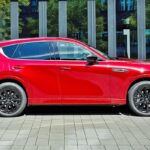
Xiaomi, which made its name as a smartphone giant, is now making waves in the electric vehicle (EV) industry. Since launching its first electric car, the SU7, in March, Xiaomi has already sold over 130,000 units—an impressive feat for a newcomer to the auto industry.
Meanwhile, Apple, once rumored to be developing its own “iCar,” has abandoned its automotive project altogether. Despite their dominance in the global tech industry, the two companies have seen very different outcomes in the automotive sector. So, what gave Xiaomi the edge while Apple faltered?


Leveraging the Tech Ecosystem: Xiaomi’s Winning Strategy
Today’s cars are more than just vehicles — they’re integrated platforms that connect to smartphones, smart homes, and other digital services. Xiaomi recognized this early and capitalized on its existing tech ecosystem, while Apple failed to make that connection.
Xiaomi has already built a strong ecosystem centered around smart home appliances, wearable devices, and IoT (Internet of Things) products. Consumers who use Xiaomi smartphones naturally purchase Xiaomi air purifiers, robot vacuum cleaners, and smart TVs. Now, cars have been added to that chain of connections. The SU7 is not just an electric car; it serves as a core hub for Xiaomi’s ecosystem, maximizing the connection between cars and smart devices in the home.
Apple, on the other hand, treated the car as an isolated product. While it likely considered integrating the iCar with iPhones, MacBooks, and iPads, the auto industry requires more than just strong product design — it demands manufacturing expertise, complex supply chains, and service infrastructure. Apple’s famously closed management style became a liability. Automakers and suppliers hesitated to cooperate with Apple’s stringent requirements, focusing instead on their existing gas and EV lines.


Government Support: China Paved the Way for Xiaomi
Another reason Xiaomi entered the EV market quickly is the full support of the Chinese government. China has designated the EV industry as a national strategic industry and has provided massive subsidies to companies to encourage growth.
Xiaomi actively took advantage of this environment. It received stable battery supplies from CATL and BYD, the world’s largest battery manufacturers, and acquired the existing production facilities of Beijing Automotive Group (BAIC) to reduce huge initial costs. With government support, it was able to build infrastructure quickly.
Apple, by contrast, faced a more challenging environment. The U.S. and Europe offered limited government incentives for EV production, making it difficult for Apple to compete in terms of price. Sticking to its premium branding strategy further weakened Apple’s position in the mass EV market. Ultimately, Apple couldn’t justify the investment and scrapped the project.


Xiaomi’s Next Move: From China to the Global Stage
Xiaomi is already preparing the SUV version of the SU7 as the second model and building a new production plant. After a successful start in the Chinese market, the company’s next goal is to conquer the global market.
While Apple failed, Xiaomi has settled in the EV market. Apple proved that a vehicle cannot be made solely with the power of a brand. At the same time, Xiaomi showed that a new vehicle brand can succeed when combined with a strong technology ecosystem and government support. Now, the question is whether Xiaomi can achieve the same success in the global market beyond China.
























